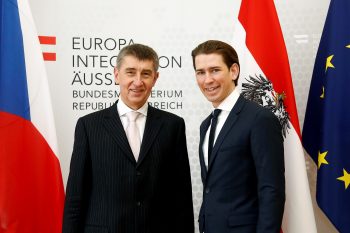
 November 14, 2017 • Analysis •
November 14, 2017 • Analysis •
In the past few weeks, two Central European countries – Austria and the Czech Republic – held national legislative elections. With the results came the predictable lamentations that there would be a new rift in the European Union, that populism had won, that right-wing extremists and euroskeptics would come to power and create “illiberal democracies.” This is nothing new. This chorus always starts when Europe’s social democrats, as well as the Christian democrats who follow their lead, lose elections.
“Euroskeptic” is the label attached to all those who do not support the EU going down a path of greater harmonization. The fact that they are convinced Europeans who favor integration only where necessary, while wanting to preserve sovereignty and regional diversity, is overlooked.
Two philosophies
There are two philosophies at work here. On one side are the centralizers, who see the EU as Europe. They focus on institutionalization, harmonization and central planning. In their view, competition needs to happen only inside narrow parameters and the markets must be controlled. On the other side are those who see the EU as just one institution which, among other means, can help Europe progress and remain globally competitive.
The members of the first group tend to direct their blame toward Central Europe. Central Europeans are not chauvinists, but they do know the meaning of oppression. Their experience of being forced into the Soviet bloc reminds them of the importance of sovereignty, but also gives rise to a deep mistrust of large institutions.
Central Europe is not drifting into a radical spiral. The problem is the established, so-called “moderate liberal democratic” movement. This dominates the political classes in the major European countries, as well as the decision makers in the European Commission and the European Parliament. They act like the management of large, lethargic corporations focusing on past success but intolerant of any deviation from their top-down processes. They are used to exploiting their existing business model at the expense of finding real ways to innovate. Their business model comes down to increasing market share by copying the competition.
Avoiding the issues
Increasing regulations limit personal freedom. Excessive harmonization damages diversity and regional customs. Similarly, the established political parties alienate part of their core constituencies by catering to smaller groups on the periphery, but avoid addressing the real issues. They lament the end of “liberal democracy” but ignore that their expediency has made them the gravediggers of democracy themselves. The system risks reducing democracy (if it has not already happened) to one day of voting every four years or so.
Party strategists marginalize every idea outside their mainstream. This is the case inside the parties, but is also directed toward political newcomers. (Though French President Emmanuel Macron was styled as a newcomer, he is not. That is why he was supported by the political establishment.)
These problems are not limited to Central Europe. In fact, the “rift” between Western and Central Europe is mostly imaginary. However, a real rift exists inside most European countries between the political class and the population, based on the above-mentioned issues.
Due to these weaknesses, Europe has proved unable to deal with the migration crisis. Allocating refugees and migrants to member states through central planning is certainly the worst solution. It is disruptive, and political movements which spell that out are attracting voters.
Victories for sovereignty
In Austria’s elections, the Social Democratic Party of Austria (SPO) experienced a crushing defeat. Since the 1940s, the SPO has always been one of the country’s top two parties. This time, it barely managed to hold on to second place, beating the Freedom Party (FPO) by less than a percentage point. The SPO will also lose the post of chancellor. The Christian-democrat Austrian People’s Party (OVP), with their 31-year-old leader, Sebastian Kurz, surged to 31 percent of the vote (from 22 percent in the last election), while both the SPO and the FPO received about 26 percent. Mr. Kurz managed to stop his party’s downward trajectory by returning to credible policies.
Mr. Kurz will likely build a coalition government with the FPO, which is widely labeled as populist, nationalist and euroskeptic. Nevertheless, the future Austrian government – despite all the doom-and-gloom predictions – will prove to be pro-European and democratic. Mr. Kurz has already confirmed his pro-European position, but he has also made it clear that the principle of subsidiarity is paramount.
Both parties agree that a cap on sovereign debt is necessary. Austria’s sovereign debt is already high, but it becomes staggering if implicit pension liabilities are included. These obligations were accumulated through decades of populist social democratic policies, supported by the OVP and SPO. The objective is to include this cap in the constitution. A two-thirds majority in the Austrian parliament is therefore needed, requiring the support of the New Austria and Liberal Forum (NEOS), a liberal party. This is likely to happen and would be a positive development.
In the Czech Republic’s elections, the Social Democrats, who had formed the previous government, were nearly annihilated. An entrepreneur, Andrej Babis, led an independent party to victory. International media stigmatized him as euroskeptic, as he is a strong supporter of Czech sovereignty. Western European media have labeled him a “nationalist liberal,” and pigeonholed him as a “populist.” He will have a challenging task forming a government, but when he does it will be pro-European (though not in favor of centralization) and democratic.
In both countries, the social democrats lost because they have no convincing programs and only offer more spending. However, they claim that the winners achieved their victory based on anti-immigration populism. While the winning parties do intend to put stronger controls on immigration, such proposals were one of many factors behind their victories – and not the decisive one.
Western self-righteousness
A certain self-righteousness prevailing in the mind of Western intellectuals stamps Central Europeans as nationalistic, backward and egotistical. The governments in Hungary, Slovakia and Poland were wrongly called autocratic and now, after these past elections, Austria and the Czech Republic will be added to the list, completing the small-minded cliche.
A high level of intolerance exists in Europe’s political and intellectual circles against every government that does not unconditionally follow the path toward an ever-closer Union. This approach, at its heart, favors centralization and aspects of a planned economy – both social democratic concepts. In consequence, there is a strong tendency to discriminate against countries whose governments adhere to different values, and label them as “illiberal democracies.”
The voters in these countries are certainly not less responsible than those in Western Europe. But they are aware that freedom and sovereignty are very precious.
A strong Central Europe is necessary for Europe’s future. Marginalizing these countries would be a sign that those in Western Europe fear change and losing the positions of power they have acquired. In 1947, as the United States faced rebuilding global frameworks after World War II, President Harry Truman stated: “America was not built on fear. America was built on courage, on imagination, and an unbeatable determination to do the job at hand.” The same should hopefully be said for Europe…

